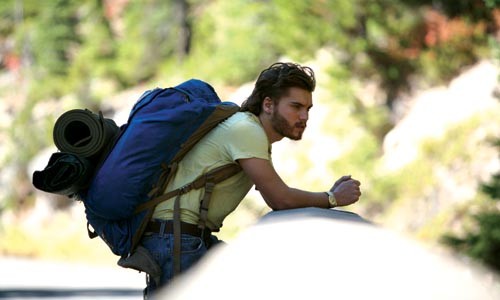The film's two bookends sum it up. We open with a quote from Lord Byron ("I love not man the less, but Nature more") and close with a snapshot of the film's real-life protagonist, Chris McCandless, subtitled with the director's dedication. In between, we've got a Romantic hero (or anti-hero, but that's splitting hairs) over whom a filmmaker fawns.
Into the Wild is director Sean Penn's adaptation of Jon Krakauer's best-selling account of McCandless' curious odyssey. After graduating from Emory University in 1990, McCandless dropped out of his well-to-do suburban life: He gave his money away, tore up his ID and hit the open road to test his mettle. In April 1992, he set off on his dream adventure, hiking alone into Alaska's woods to live off the land. By mid-summer, he had starved to death in the abandoned bus that had become his home.
Like Krakauer's book, the narrative jumps around: Penn's screenplay cuts between McCandless' few months in Alaska and the nearly two-year journey that preceded it. But while Krakauer respected and even admired McCandless' ethos, he was tougher on him, tempering his empathetic approach with caution about youthful bravado cloaking dangerous naiveté, and flagging McCandless' casual cruelty. Penn, another child of privilege who often presents himself as an iconoclast motivated by earthy values, is more sympathetic. Thus his version is a sentimental eulogy to its Byronic hero, who was sure that his ascetic rejection of the modern world would lead to wisdom.
It's tricky on film to depict McCandless' solitary growth; the real McCandless kept sporadic journals. Penn pads the two-and-half hours with pretty scenery (much of it captured in swirling aerial shots) and bucolic scenes of McCandless enjoying the outdoors. But en route, McCandless encounters folks whose interactions help Penn sketch out the rover. There's a pair of hippies in a beat-up RV (Brian Dierker and Catherine Keener); an angelic ingénue (Kristen Stewart); a boozy rake of a South Dakota famer (Vince Vaughn); and a retired vet and desert rat (Hal Holbrook).
I wish Penn had cut back on McCandless' jaunts and the B-roll nature footage to depict more of McCandless' family in their uncomprehending struggle. (After Emory, they never hear from him.) Will Hurt effectively portrays McCandless' emotionally distant and autocratic dad, and Marcia Gay Harden his mom. However, most of the family's experience, as well as its formative history, is delivered in a voiceover from McCandless' younger sister, Carine (Jena Malone).
Cited but never fully developed is the unresolved anger -- with his parents, capitalism, "sick society" -- that also drives McCandless. It's no secret that the modern world can be an ugly, soulless place, yet Penn wastes time on a segment set in downtown Los Angeles that amateurishly contrasts cold gleaming towers of finance with the stumblebums on Skid Row. (And I'm not sure that the irony -- that McCandless is an indigent drifter by choice -- isn't lost on Penn.)
In the plus column, it may be Penn's background as an actor that lets him keep a steady hand on his cast, who are almost universally restrained when the temptation may have been to go long. Holbrook, particularly, has chewed a lot of scenery in his day, but his low-key performance here is heartbreaking. And Wild will surely catapult Hirsch out of the ghetto of fair-to-dreadful teen films in which he's been toiling. His McCandless, softened with his puppy-dog good looks, may be less complex and aggravating than Krakauer's characterization, but Hirsch's physical commitment to the role -- he's all spring-loaded sinewy grace; then deathly emaciated -- will be noted at future casting calls.
While Penn's work is missing the harder edges that Krakauer explored, the film is still a fascinating character study and homage to our collective romance of the road and its purported freedoms. McCandless was ultimately unknowable, yet he embodied qualities and dreams that many aspire to, even as his intelligence, ego and single-mindedness conspired to derail him. 














